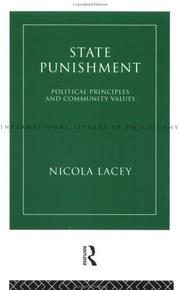| Listing 1 - 2 of 2 |
Sort by
|
Book
ISBN: 9780521728294 9780521899475 0521899478 0521728290 9780511819247 1107188113 9786611751210 0511414544 0511415222 0511412002 0511819242 1281751219 0511412932 0511413858 9780511415227 9781107188112 9781281751218 6611751211 9780511414541 9780511412936 9780511412004 9780511413858 Year: 2008 Volume: 2007 Publisher: Cambridge: Cambridge university press,
Abstract | Keywords | Export | Availability | Bookmark
 Loading...
Loading...Choose an application
- Reference Manager
- EndNote
- RefWorks (Direct export to RefWorks)
Over the last two decades, and in the wake of increases in recorded crime and other social changes, British criminal justice policy has become increasingly politicised as an index of governments' competence. New and worrying developments, such as the inexorable rise of the US prison population and the rising force of penal severity, seem unstoppable in the face of popular anxiety about crime. But is this inevitable? Nicola Lacey argues that harsh 'penal populism' is not the inevitable fate of all contemporary democracies. Notwithstanding a degree of convergence, globalisation has left many of the key institutional differences between national systems intact, and these help to explain the striking differences in the capacity for penal tolerance in otherwise relatively similar societies. Only by understanding the institutional preconditions for a tolerant criminal justice system can we think clearly about the possible options for reform within particular systems.
Imprisonment --- Criminal justice, Administration of --- Criminal justice, Administration of. --- Imprisonment. --- Administration of criminal justice --- Justice, Administration of --- Crime --- Criminal law --- Criminals --- Confinement --- Incarceration --- Corrections --- Detention of persons --- Punishment --- Prison-industrial complex --- Prisons --- Law and legislation --- School-to-prison pipeline --- Law --- General and Others --- Imprisonment - Great Britain --- Imprisonment - United States --- Imprisonment - Europe, Western --- Criminal justice, Administration of - Great Britain --- Criminal justice, Administration of - United States --- Criminal justice, Administration of - Europe, Western --- Emprisonnement --- Justice --- Grande-Bretagne --- Etats-Unis --- Europe de l'Ouest --- Administration

ISBN: 113483800X 128011018X 1134838018 0203297482 0203046064 9780203046067 9781134838011 0415109388 9780415109383 9781134837960 9781134838004 9781138178502 Year: 1994 Publisher: London New York Routledge
Abstract | Keywords | Export | Availability | Bookmark
 Loading...
Loading...Choose an application
- Reference Manager
- EndNote
- RefWorks (Direct export to RefWorks)
Nicola Lacey presents a new approach to the question of the moral justification of punishment by the State. She focuses on the theory of punishments in context of other political questions, such as the nature of political obligation and the function and scope of criminal law. Arguing that no convincing set of justifying reasons has so far been produced, she puts forward a theory of punishments which places the values of the community at its centre.
Punishment. --- Punishment --- Penalties (Criminal law) --- Penology --- Corrections --- Impunity --- Retribution --- Moral and ethical aspects.
| Listing 1 - 2 of 2 |
Sort by
|

 Search
Search Feedback
Feedback About UniCat
About UniCat  Help
Help News
News